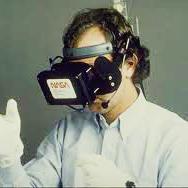Many people often take walking for granted, but for individuals with mobility disabilities, this seemingly simple act can feel out of reach. This reality can foster a sense of disconnect from the world since walking is a fundamental way in which people interact with each other and the environment. Advances in virtual reality and its immersive capabilities have made it possible to enable those who have never walked in their life to virtually experience walking. We co-designed a VR walking experience with a person with Spinal Muscular Atrophy who has been a lifelong wheelchair user. Over 9 days, we collected data on this person's experience through a diary study and analyzed this data to better understand the design elements required. Given that they had only ever seen others walking and had not experienced it first-hand, determining which design parameters must be considered in order to match the virtual experience to their idea of walking was challenging. Generally, we found the experience of walking to be quite positive, providing a perspective from a higher vantage point than what was available in a wheelchair. Our findings provide insights into the emotional complexities and evolving sense of agency accompanying virtual walking. These findings have implications for designing more inclusive and emotionally engaging virtual reality experiences.
翻译:暂无翻译




